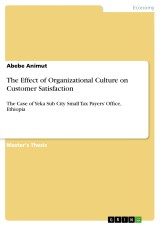Details

The Effect of Organizational Culture on Customer Satisfaction
The Case of Yeka Sub City Small Tax Payers' Office, Ethiopia1. Auflage
|
CHF 37.00 |
|
| Verlag: | Grin Verlag |
| Format: | |
| Veröffentl.: | 26.11.2020 |
| ISBN/EAN: | 9783346304698 |
| Sprache: | englisch |
| Anzahl Seiten: | 100 |
Dieses eBook erhalten Sie ohne Kopierschutz.
Beschreibungen
Master's Thesis from the year 2019 in the subject Business economics - Business Management, Corporate Governance, grade: A, , course: Business Adminstration, language: English, abstract: Organizational culture plays a significant role in the overall performance of a particular organization. It becomes an increasingly important factor for organizational survival in the current dynamic environment. Customer satisfaction is one measurement of organizations performance based on the quality of services provided. This study tries to examine the effect of organizational culture on customer satisfaction in Yeka Sub City Small Tax Payers’ Office.
The employed semi-structured questionnaire as data gathering tools for the sample population and non-participant observation was also employed as data gathering tool to supplement questionnaire. The total sample size was 249 out of which 232 questionnaires were completed and included in the analysis part. The responses of respondents were analyzed using descriptive statistics and narration. SPSS software was used in analyzing the collected data. The results of analysis showed mixed responses. The correlation coefficients show that all independent variable were found to be positively correlated with customer satisfaction though there is a discrepancy in their strength. Moreover, multiple regression analysis was used to determine the effect of all independent variables on a dependent variable, customer satisfaction. And accordingly, customer satisfaction is found to be primarily predicted by higher level of reliability, tangibility, team orientation, responsiveness, customer orientation and stability of organization.
Meanwhile, the employee satisfaction is mostly predicted by higher level of stability, outcome orientation and innovation and risk taking. Generally, it was found that when 65 % of observed variability in customer satisfaction can be explained by independent variables included in the study, 54 % of observed variability in employee satisfaction is found to be explained by change in independent variables included in the study organization.
The employed semi-structured questionnaire as data gathering tools for the sample population and non-participant observation was also employed as data gathering tool to supplement questionnaire. The total sample size was 249 out of which 232 questionnaires were completed and included in the analysis part. The responses of respondents were analyzed using descriptive statistics and narration. SPSS software was used in analyzing the collected data. The results of analysis showed mixed responses. The correlation coefficients show that all independent variable were found to be positively correlated with customer satisfaction though there is a discrepancy in their strength. Moreover, multiple regression analysis was used to determine the effect of all independent variables on a dependent variable, customer satisfaction. And accordingly, customer satisfaction is found to be primarily predicted by higher level of reliability, tangibility, team orientation, responsiveness, customer orientation and stability of organization.
Meanwhile, the employee satisfaction is mostly predicted by higher level of stability, outcome orientation and innovation and risk taking. Generally, it was found that when 65 % of observed variability in customer satisfaction can be explained by independent variables included in the study, 54 % of observed variability in employee satisfaction is found to be explained by change in independent variables included in the study organization.
Diese Produkte könnten Sie auch interessieren:

Die Erfolgsfaktoren des Change Managements. Am Beispiel des schwedischen Möbelriesen IKEA

von: Johanna Otto

CHF 16.00
















